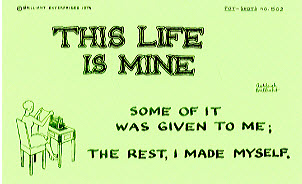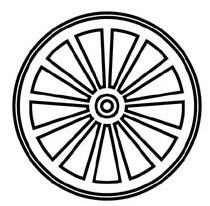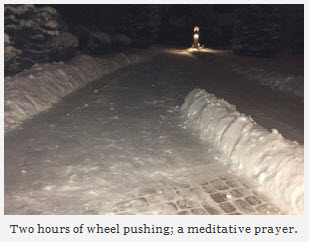(Go here to read the Introduction to the series.)
The Point of Sale concept is integral to the nine other Systems Mindset concepts that will follow. Ultimately, getting solid control of one’s life is the goal and the Point of Sale posture is an essential ingredient in pulling that off… .
Point of Sale

The Point of Sale (POS) principle has always been important to me – see chapter fifteen in my book – but for the past two years it’s been the nexus of my moment-to-moment thinking. In that time-frame the concept helped me survive four excruciatingly painful personal relationship challenges that included the death of my parents. And all this was exasperated by my serial, hospital-level health problems. Yet in this down-time, Point of Sale was much more than solace. Despite my stupor, it vaulted me ahead financially and professionally and personally. (I didn’t recognize the vaulting-ahead part until recently, as I emerged from my burrow.)
During those tough years I traveled a lot, hiding-out by getting away. I was indolent and unfocused much of the time. But in tiny bursts, my comportment was mercenary: back-on-track and focused. During those brief but lucid periods I would fixate on keeping the mechanical wheels of my life turning, and that was plenty enough.
Now I know this for sure: my mechanical wheels don’t give a damn about my mental state, physical condition, personality, intelligence, motivation level or even how long and hard I work. My wheels have lives of their own and they just want half an excuse to get rolling and then to keep rolling. All they ask is for my occasional attention.
The Point of Sale stance is mechanical and that is the thread of this post.
In those two years, how much did I falter? LOTS. I squandered vast quantities of time as I emotionally and physically stumbled, trying to get my head screwed on straight and my body back to some kind of pain-free stasis. Nonetheless, when my old motivation briefly emerged, I spent that time working on the wheels.
I’m sure my “wheel time” was less than five percent of all the work time I could have expended, but it was enough to not just survive emotionally and physically, but to thrive.
And now I’m fully back to my regular self with mistakes absorbed, deaths in the family accepted, on-the-rocks relationships repaired, health regained, new businesses started, real estate purchased, gross revenues at record levels (literally and figuratively). Life is good again and for this I thank the Point of Sale posture.
The Point of Sale term was “coined” in the cash register industry and it illustrates the importance of getting wheels rolling immediately (and then keeping them rolling along fast, without direct supervision). And the term indirectly references the converse: the seeking out and elimination of wheels that are rolling in the wrong direction.
But, there is more to the posture. It’s not just do-it-now or just-do-it.
In my book I talk about the importance of having a systems-analogy running in the mental background (see chapter nine). The purpose of the systems-analogy is to keep one on-track, and here’s the one that has obsessed me over the past two years. Note the specific details. It’s important to paint a picture:
I play a game in which I stand in the middle of a large open, flat grassy field. The sun is just coming up and it’s going to be a gorgeous warm day. My position is at the precise center of an imaginary circle (yes, my circle of influence). From where I stand, the circle’s radius is maybe five hundred feet. I’m relaxed, thinking and watching, looking outward and taking it all in, scanning 360 degrees around. In one direction, in an outward expanding pie shape with me standing at the apex, are the requirements of my various businesses. In another direction, the expanding cone contains my health and physical chores, and in yet another aspect are my friend/family relationship tasks. I stand there, thinking about what I must accomplish that day. Then those tasks materialize in front of me in the form of a half-dozen large, wooden wheels. They surround me. Five feet in height (I can see over their tops), each wheel is standing up on edge with the twelve inch wide rim facing me (which means the rim on the opposite side is facing directly out towards the perimeter of the circle). Each wheel is light-framed and well constructed, with wooden spokes emanating from the hub to the rim, holding it all together (imagine a water wheel). The task-wheels are just standing there, surrounding me, immobile and balanced on their rims, with those rims a mere arm’s length away…and it’s my simple chore to push those wheels; to get them rolling outward, out of my immediate proximity and headed toward the edge of my circle. So one by one I firmly shove them off and they trundle away. I pause for a moment to watch, but then promptly summon up more task-wheels, one at a time. As they appear I quickly push them off, too.

This analogy is about accomplishment and the wheels represent tasks-to-be-done.
Whether I’m paying attention or not, when a rolling wheel reaches the outside perimeter, that task is complete.
I like this game because I feel control and satisfaction. At any time I could walk away but I choose to stay.
If I didn’t push the wheels away from me, toward the perimeter, they would accumulate until I was hemmed in behind dozens of adjacent wheel rims. But that’s not what happens because I stay ahead of things, dispatching the wheels as soon as they materialize next to me. It’s always clear around me as I eagerly await the next wheel’s appearance, ready to instantly push it away. I push, push, push and the wheels roll away in their prescribed trajectories, some moving faster than others. There’s a LOT of movement going on out there but my involvement with that movement is minimal. I’m the instigator; not the doer.
As the leader, my job is to evoke tasks and then quickly give them to other people to complete.
It’s a dance.
(And if I just stand there without envisioning new undertakings? Then no wheels appear and it’s just me, standing idle in the middle of a field.)
So back here in my tangible world, my task is to decide what’s to be done and then, one-by-one, immediately get those tasks in motion. I conceptualize those wheels and then immediately get them rolling away from me. That’s my job. Whether it’s an early morning three-hour writing session (like this one), or a quick meeting with my COO and bookkeeper (at 9:00 this morning), coffee with one of my business partners (at 10:00), my weekly two-hour massage (this afternoon at 1:00), taking my daughter Jenny and my two grandchildren to dinner (tonight at 6:00), or a call later this evening to a dear friend up in British Columbia who is recovering from major surgery, I keep pushing those wheels outward.
Push. Push. Push.
In the game-analogy, are there ever any wheels that spontaneously materialize, unsolicited by me? Not often, because a long-term consequence of the game is that there is little fire-killing in my life. I carefully manage the processes of my existence so they produce only the results I want.
No fire-killing. No surprises.
And what about you? Does this make sense? Can you see how you could adopt this stance to positively affect your own life?
This wheel-turning analogy is my contrivance. It feels right to me. Use it for yourself or devise one that suits you better. Then, imbed it in the back room of your consciousness.
Perform Point of Sale all day long.
I live in Bend, Oregon and this is New Year’s Eve. Yesterday, snow fell steadily and it plugged my driveway. So last evening, because snow is never lighter than when it first falls, my wheel-pushing consisted of two hours of snow-shoveling in the dark. There was twelve inches of fluffy, light powder and I worked steadily, and it turned into a physical, meditative prayer to my recently deceased father. As I worked, I thought back to long ago, to another dark, cold night-time driveway choked with snow. Last night I was my eleven-year old self, way back there in the tiny village of Port Leyden, in remote upstate New York. It was 1960 and I was bundled up in the darkness, there with Dad in the still, quiet cold. The snow was still falling. We each had our shovels. As we quietly worked alongside each other in the faint glow of a single streetlight, there was only the muted scrape, scrape, scrape of our shovels as we slowly moved the deep white blanket of fluff off the driveway and up over the towering snow banks (the depth of a new snowfall in my childhood driveway was often four feet or more, there in the heart of the Black River-Tug Hill snow belt).

There was a mechanical job to be done right now, before the weather warmed up and the snow became heavy. Dad envisioned the project and recruited me. We both bundled up and exited the house into the storm and then we hit it hard. The two of us were relentless. We plugged away silently and thoughtfully and it was sometimes a three-hour epic. Those raw wheel-turning projects were enormously satisfying and at the end of the job, exhausted, we would quietly stand together for a moment and take pride in what we had accomplished. We had carved a perfect path through the onslaught of the storm. Then we turned around, left our shovels on the porch, stomped the snow off our boots and withdrew back inside the house where it was always warm and cozy.
Dad wasn’t physically with me last night but the right now wheel-turning was no different. Thanks Dad, for teaching me this lesson.
These days, in my business work, the major wheel-pushing is by me, with the legwork handled by my staff (Automate! Delegate! Discard!). Within their own various realms, my managers are wheel-pushers too. The business wheels roll outward with our firm nudges. For each of us there are numerous wheels rolling, some in sequence and some simultaneously. And for me, beyond the satisfaction of watching it all unfold, the payoff includes a solid income stream as well as the personal luxury of having lots of time: to write, to read, to be with my friends and my family, to travel, to create more machines, to do whatever I feel like doing.
And, again: attitude, IQ, personal history, energy level or how hard one works doesn’t matter all that much. In creating freedom in one’s life, the wheels are what matter; that they are conjured up and then driven forward.
Like I said: It’s about the mechanics.
This is the vision I carry every minute of every day. Is it tedious? No. It’s a creative delight. It’s exactly what I want to do with this life, to spend my time in the center of that field, nudging those wheels outward.
So, over a period of two years I was mentally and physically trashed, yet a tiny bit of intense mechanical wheel-turning did the trick. And the POS mindset has been of even more benefit than that: Intensely applying it, keeping it at the center of my thought process, has been an ongoing self-declaration of life control.
With just a little bit of POS management, the payback is astounding. It doesn’t take much.
Think about creating wheels and then think about pushing them outward, away from yourself. For starters, perform this POS thought process within the context of what you do now. Don’t turn the big things of your life upside down (not yet, anyway). For now, get a feel for how this works. Be patient. Be deliberate, go slow and do things in the right sequence. Practice.
I pointed this out at the beginning but it’s important enough to say it again: As you follow along in this ten-part series, you’ll see that each of the upcoming nine concepts will lean heavily on the POS principle.
Here’s three homework-tasks intended to imbed the Point of Sale strategy deep inside:
- Read Chapter 15 in Work the System: The Simple Mechanics of Making More and Working Less. If you don’t have it yet, it’s available here on my website, for free in PDF or audio; at my cost for the hard copy.
- On the website, read the essay Clustering. It’s another Systems Mindset posture, intended to help you eliminate the negative mind-baggage that is the cost of prioritizing.
- And as you go through the next few days think about the opposite of procrastination, this thing called Point of Sale. Think about how you can get the wheels rolling quickly, NOW.
Questions? I’m here. Leave a comment below or email me at info@workthesystem.com.
Ten Concepts That Obsess Me Now
Introduction
Part 1, Point of Sale
Part 2, Critical Thinking Search and Rescue
Part 3, A Business is a Dispassionate Machine
Part 4, Hyper-Efficiency Via Total Inbox
Part 5, Emailed Voice Mail (EVM)
Part 6, Thinking Slow, Moving Fast
Part 7, Deal Killers and the Main Machine
Part 8, The Simple Key to Double Sales and Create Raving Fans
Part 9, The Tail Wagging the Dog Syndrome
Part 10, Do You Have Quiet Courage?
Illustrated epigram by Ashleigh Brilliant. www.ashleighbrilliant.com
